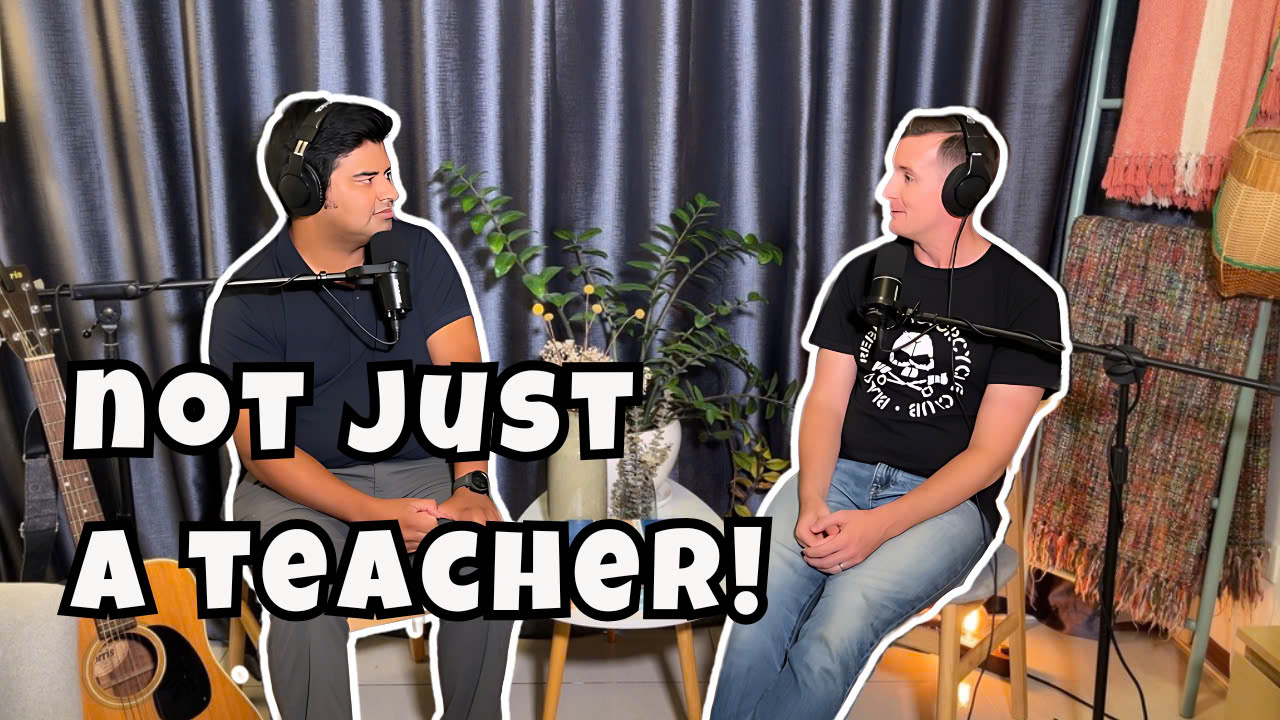In 2019, I started A Vietnam Podcast with a cheap microphone, zero experience, and a simple idea: share real stories from real people living in Vietnam. One of my very first guests was Sandy, a fellow English teacher and good friend.
Six years later, many things have changed, so we had a lot to say. We talked about everything from the early days of podcasting to law school, adoption, cultural differences, and why Vietnam still has such a pull on both of us.
Memories From The Early Days Of Podcasting
When Sandy first joined me on the podcast in 2019, neither of us had any idea where it would go. Back then, we were two English teachers in Saigon, sitting in my apartment, trying to record a podcast with a cheap little mic. I still have that mic. It was a small round condenser mic that picked up every sound in the room — traffic, fans, footsteps, everything. It broke after six months, but I still take it out sometimes just to see if it works again. It never does.
I tried different ways to improve the sound. Once, we put pillows and blankets all around the bedroom to make it sound better. I even turned off the air con — it got hot and sweaty very quickly. We were in there for hours trying to get a clean recording. Looking back, it was a mess, but it was fun.
A lot has changed since then. We’re still recording in my front room, but now it looks like a real studio. The equipment is better. The sound is better. The guests are still great — and Sandy is one of them.
Are Expats “Just” English Teachers?
When Sandy said the words “just an English teacher,” I had to stop him. That phrase is exactly why I started this podcast in the first place.
Back when we worked together, I used to hear that all the time. People would say, “I’m just an English teacher,” like it meant they didn’t have anything to offer. But I hated that mindset, because nobody is just anything.
Every person I met in the English teaching world were not only a qualified and competent English teacher, they had something else going on. One guy made handmade leather goods. Another person was a dancer. Many had degrees in things like finance, drama, or business. Everyone had a story — and I wanted to hear those stories.
Sandy said he was “just a guy,” and that reminded me of another guest I reached out to recently who said, “I don’t have anything interesting to say.” But I really believe that everyone has something interesting to say. That’s what this podcast is about — real people sharing real stories. Not celebrities or influencers. Just everyday people with something to share.
The Decision to Vietnam – A Life-Changing Journey
Sandy came to Vietnam at a turning point in his life. He had tried law school in the U.S., but it wasn’t a good fit. After leaving school, he moved to Salt Lake City, where he stayed on a friend’s couch and worked at a ski resort while deciding what to do next.
He remembered meeting Vietnamese friends during university. They had told him about foreigners teaching English in Saigon and how some had even learned the language. That idea stayed with him for years.
Later, when he planned to take a teaching job in Shanghai, he posted about it on Facebook. One of his Vietnamese friends replied and encouraged him to choose Vietnam instead, saying the air quality was better. Sandy took that advice. He found a CELTA course in Saigon and decided to make the move.
That decision started his journey in Vietnam.
Preparing for Vietnam
Before moving to Vietnam, Sandy actually prepared more than most people I’ve met. He watched a few documentaries — including Top Gear and some Anthony Bourdain episodes- to get an idea of what life here might be like. But other than that, he didn’t do much planning.
He spoke to a few Vietnamese friends back in the U.S. They were from smaller towns and told him that driving in Saigon was scary, which didn’t help much. He didn’t learn much Vietnamese before arriving either. His CELTA program offered a week of very basic training — how to say simple things like numbers and greetings. That was it.
Culture Shock
He was shocked by the traffic, the narrow streets, and the way power lines were wired in huge tangled bundles overhead. Even crossing the street felt terrifying. But that’s a feeling most of us remember from our early days in Saigon.
We ended up laughing about the volume differences between cultures. Sandy agreed that Americans are loud, even more so when they’re in groups. I joked that you always hear Americans before you see them, especially on group tours.
Having lived in both the UK and the US, I’ve noticed the contrast. In the UK, people tend to speak quietly in public. In the US, everyone speaks at the same volume, which feels normal there. But when Americans travel, they suddenly sound much louder than everyone else, not because they’re shouting, but because they’re used to a different standard. We laughed, but it’s something you really notice when you’ve lived in multiple places.
Why Sandy Keeps Coming Back to Vietnam
This trip marked Sandy’s third time returning to Vietnam since he left in 2019. We kept in touch over the years through social media, but it was more than that — he still had strong friendships with people he met during his first few weeks here. Many of them, like me, were still living in Vietnam. Coming back always felt natural for him, like no time had passed.
What Sandy Misses When He’s Away
I asked Sandy what he misses most about Vietnam when he’s not here. His answer wasn’t the cost of living, although that’s definitely a factor. What he misses most is how easy it is to make friends. He said many of the people he met in his first few weeks are still his friends now.
He also talked about how convenient everything is. Not only are there convenience stores on every block, things just feel easier here, especially when it comes to everyday needs. Back in Atlanta, getting medicine delivered when he was sick cost him nearly $90. In Vietnam, it’s fast, simple, and much cheaper.
From English Teacher to Adoption Lawyer
When Sandy was last on the podcast in 2019, he was just about to leave Vietnam to go back to the U.S. and study law. This time, he came back as a lawyer.
He spent three years in law school, then passed the Bar exam, and has now been working for over two years. He admitted that law school was tough. Most lawyers will tell you the same. The workload was heavy, with long days of study and classes. At one point, he even had a breakdown while studying for the bar. He said he couldn’t get out of bed and physically couldn’t keep going — but he did. And it paid off.
Helping Create Families
One of the things Sandy loves most about his job is helping people build families. He said that when adoption hearings happen in court, judges often say it’s the best part of their day. After all the stress and legal steps, when the final adoption is approved and the papers are signed, everyone is happy. They take pictures, celebrate, and go home as a new family.
Sandy spoke with pride about being part of that process. He said the clients can be stressed in the lead-up, but once the hearing is done, it becomes a really joyful moment. And he gets to be a part of that, again and again.
The Rise of Learning and Using English
Sandy noticed how much the level of English has improved since his early days in Vietnam. Years ago, tour guides would bring you to a site, tell you to “go look,” and then move on. Now, guides speak clearly, explain history and culture, and make the experience more meaningful. It stood out to him just how far things have come.
He also found it interesting that most of the people on his tour were Asian, from places like Japan and the Philippines, but the tour was still in English. Everyone was friendly and respectful, and the overall experience was a big change from what he remembered when he first arrived in 2019.
Can Vietnamese People Speak Perfect English?
Ten years ago, many students could speak some English, but pronunciation was often hard to understand. Now, it’s completely different. The improvement is incredible, especially when it comes to how clearly people speak.
Sandy told a story about a recent tour guide he met in the Mekong Delta. The guide spoke fluent, clear English, and when Sandy asked if he had studied abroad or attended an English center, the guide said no. He had just learned by watching movies, listening to music, and repeating what he heard. That kind of self-learning is impressive and more common than people think.
I remembered a guy I once met who worked at Eddie’s in District 1. When I first heard him speak, I thought he must have studied in Birmingham, England — his accent was spot-on. But no, he had never left Vietnam. He had learned English by watching Peaky Blinders. So now he speaks with a strong Birmingham accent… from the early 1900s! I always wondered what people in the UK would think if they heard him.
Listen more: What Makes Life So Different in North and South Vietnam
Big Changes in Saigon
Besides language skills, Sandy pointed out other major changes since his first visit. One of the most noticeable was the rise of electric vehicles. Vietnam now has electric taxis, bikes, and even entire ride-hailing apps dedicated to EVs. Sandy said this is something he rarely sees back in the U.S., and it impressed him how quickly Vietnam is adopting green transport.
Another big change is the number of giant LED billboards lighting up the city. They weren’t there when he left, and now they’re everywhere. We joked that while they’re exciting, they also block out the buildings behind them — a sign of how fast the city is developing.
Seeing Vietnam Through a Lawyer’s Eyes
That said, there are things he admires about Vietnam’s flexibility. In his hometown of Atlanta, zoning laws make it nearly impossible to live above a shop or open a small café in a residential area. In Vietnam, mixed-use buildings are everywhere — people run shops from their front rooms, or sell coffee from carts on the sidewalk. It’s a freedom that just doesn’t exist back home.
We talked about how this looser system has both pros and cons. Safety regulations exist in Western countries for good reason, but they also make starting a business much harder. In Vietnam, the food carts might not follow strict codes, but the community sort of polices itself — if a place made people sick, it wouldn’t stay open for long. In some ways, that works too.
Conclusion
Catching up with Sandy was a reminder of how much can change in a few years — and how some things stay the same. We’ve both grown a lot since 2019, but our love for Vietnam and the people we met here hasn’t changed.
Sandy’s journey from being an adoptee to becoming an adoption lawyer is something truly inspiring. And hearing about his perspective on Vietnam, now through a legal lens, made for a really honest and thoughtful conversation.
If you’d love to listen more, follow and share A Vietnam Podcast for more stories and experiences about Vietnam!
This Season is sponsored by Premier Dental. Discover the potential of a confident and healthy smile with the excellent dental clinic in Ho Chi Minh

